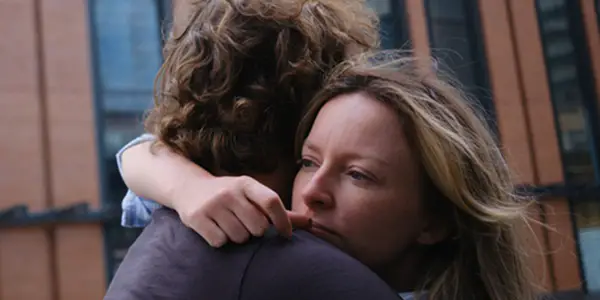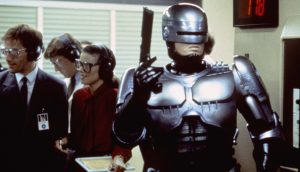
Writer-director Kazik Radwanski reunites with actors Deragh Campbell and Matt Johnson from Anne at 13,000 Ft.—the story of a woman in quarter-life crisis who becomes obsessed with recreating the feeling of exhilaration she had during her first sky-dive—for Matt and Mara, another lo-fi tale of troubled Torontonians trying to find themselves without destroying themselves in the process. The film centers on a young writing professor and the instability she invites into her painfully stable life by reconnecting with an old friend; sparks fly in both directions, but both shy away from letting them truly catch fire. It’s the kind of film where, on the surface, it might seem that nothing is happening, but much as in life, even the smallest moments can impact how you approach the future.
Ghost of a Good Thing
Campbell is Mara, a creative writing professor in an unsatisfying marriage to an experimental musician, Samir (Mounir Al Shami); in a scene that epitomizes the film’s keen ability to elicit laughter from the most uncomfortable and awkward social situations, Samir’s friends voice their inability to understand how he ended up married to Mara, who says she doesn’t care for music at all. Johnson is Matt, a freewheeling writer and old university pal who abruptly drops back into Mara’s life; he’s been living in New York and enjoying some commercial success, while Mara’s own writing has taken a back seat to her academic pursuits and her young daughter.
source: Cinema Guild
On the surface, the two of them seem to have radically different personalities; Matt comes off as loud, confident, and narcissistic, albeit in such a way that you cannot help but be charmed by his bravado, while Mara is quieter, more sensitive, and much more likely to question herself. One gets the impression they haven’t talked in a while, yet once upon a time, they were an inseparable unit. At one point, Mara wonders out loud what happens to people defined by their friendship with someone else when they’re no longer friends with that person; it’s clear she’s talking about herself and Matt. Yet it’s also clear that she’s barely mentioned such a defining friendship in her life to Samir; that she has avoided telling her husband about Matt in both the past and the present tells you all you need to know about her relationships with both men.
So Long, So Long
Once Matt and Mara reconnect—in another hilariously awkward scene where they get kicked out of a closing coffee shop by a passive-aggressive barista that can only be described as a meet-again-cute—it’s clear that the two of them connect on a level that they probably never could with anyone else. At the same time, one gets the sense that if these two did try to make a go of it as a couple, they’d eventually make each other miserable. As a friend warns Mara about inviting Matt to speak to her class, his personality is so big that it swallows up everything around him; once he’s gone, there’s nothing but an empty void left behind.
source: Cinema Guild
Like Anne at 13,000 Ft., much of Matt and Mara feels naturalistic enough to verge on documentary. This is partially because of the improvisational way that Radwanski works with his actors and partially because Campbell and Johnson have enough chemistry to fill a long-running television series, let alone an 80-minute movie—though, your mileage may vary depending on how likable you find their characters, including and especially when they’re engaging in acts of emotional self-sabotage. Since the death of the legendary Gena Rowlands, it’s safe to say that no one plays women on the verge of unraveling better than Campbell, while Johnson’s livewire charisma is (almost) enough to make you forgive Matt even in his most obnoxious moments. Their conversations ramble on, but I found them so enjoyable to listen to that I wouldn’t have minded if they went on even longer; for better or worse, they sound like real people.
The turning point of Matt and Mara occurs when Samir abruptly backs out of driving Mara to a writing conference in Ithaca that she’s been asked to speak at and Matt steps in to take his place. Between hours spent in the claustrophobic environs of the car and a spontaneous stop at notoriously romantic Niagara Falls (possibly the best scene in a movie littered with great scenes), the tension bubbling between them comes close to boiling over. Cinematographer Nikolay Michaylov, who was also responsible for the handheld cinematography and extreme close-ups of Anne at 13,000 Ft., once again gets close to the actors’ faces and bodies and allows the camera to linger, often uncomfortably so; much as Matt and Mara are themselves hyper-aware every time they’re too close to each other, so is the audience aware of these fleeting moments of intimacy and everything they mean to the characters.
Conclusion
When Matt accompanies Mara to get her passport photo taken, the store owner assumes they’re married, and one can understand why he’d make such an assumption. When Mara plays along with it, and Matt figures it out, he’s not mad; if anything, he’s almost wistful. To each other, they represent a path not taken, yet at the same time, neither can stop wondering whether it’s not too late to take that path after all. However, if you’re wondering whether their will-they-or-won’t-they dance is worth watching, the answer is an easy yes.
Matt and Mara opens at the IFC Center in New York on September 13, 2024.
Does content like this matter to you?
Become a Member and support film journalism. Unlock access to all of Film Inquiry`s great articles. Join a community of like-minded readers who are passionate about cinema – get access to our private members Network, give back to independent filmmakers, and more.








